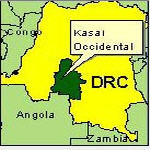KINSHASA, 30 August 2007 (IRIN) - An epidemic suspected to be haemorrhagic fever has broken out in the Mweka area, about 100km north-west of Kananga, the administrative centre of Kasai Occidental province in the Democratic Republic of Congo, with more than 100 deaths, according to health authorities. 
Photo: IRIN 
The provincial doctor, Jean-Constatin Kanow, said 217 people had contracted the disease, of whom 103 had died, three of them children, since 8 June.
According to Kanow, the epidemic affected four villages: Kampungu, Makonono, Kaluamba and Mombo, but it had not been firmly identified yet and it was still progressing.
"We suspected a typhoid fever but now we think it is a haemorrhagic fever," said Kanow.
Specialists from the World Health Organisation said they were aware of the outbreak but were waiting for the test results, said a WHO doctor, who wished to remain anonymous as only Congolese officials have the prerogative to communicate with the media on the subject.
Kanow said the disease was first recognised on 8 June after the death of two village chiefs. "All the people who assisted in the burial of these chiefs have died," he said.
About 30,000 people live in the four villages. However, the rest of the population in the Mweka health area are at risk of catching the disease. Two provincial health investigation and intervention teams are visiting the villages.
"We have sent a team of doctors and researchers and we are waiting for the results, which will be available after the samples have been examined in laboratories," said the vice-minister of health, Ferdinand Ntua.
The provincial authorities have already been taking care of the patients and sent medicines as well as chlorine to disinfect the water.
According to Kanow, the disease is spread through contact with sick and infected people. Its first symptoms are fever, vomiting, diarrhoea with blood and dehydration, which lead to the patient's death.
"It all happens in five to seven days," said Kanow.
The DRC has already witnessed several epidemics of haemorrhagic fevers. The worst was the Ebola outbreak in 1995 in the city of Kikwit, in Bandundu province, where about 250 people died.
Elsewhere, Marburg fever also had devastating consequences last year, notably in Watsa and Durba in Oriental province.
ei/re/mw
Related articles
- • 'Deadly environment' plus 'political and social' obstacles hinder Ebola fight, Security Council hears (July 24, 2019)
- • Ebola outbreak declared an international Public Health Emergency (July 17, 2019)
- • DR Congo: The country that knows how to beat Ebola (December 11, 2014)
- • Ebola Epidemic Resurfaces in DR Congo's Equateur Province (August 25, 2014)
- • At least 60 killed as train derails in Katanga province (April 23, 2014)
- • Kabila Leads Partial Election Results (December 3, 2011)
- • Kamerhe Rejects Single Opposition Candidate Strategy (November 19, 2011)
- • Congo, India to Build Hydro Plant (July 12, 2011)
- • One Survivor, 20 Dead after Plane Crash in Bandundu (August 25, 2010)
- • Muzito Signs $42 million Loan Agreement with India for Kakobola Dam (August 5, 2010)
- • Officials Revise Death Toll from Boat Accident (July 30, 2010)
- • 138 Dead after Boat Sinks on Kasai River (July 29, 2010)
- • End of Ebola outbreak (February 17, 2009)
- • UN calls on rebels to resume talks with Government (January 2, 2009)
- • Archbishop Djomo elected new president of the CENCO (July 14, 2008)
- • Government announces end of Ebola outbreak (November 20, 2007)
- • United States Support to the Democratic Republic of the Congo (October 31, 2007)
- • MONUC denounces the presence of children in FARDC's ranks (October 31, 2007)
- • Monitoring of Ebola "must continue" (October 3, 2007)
- • CDC scientists travel to Democratic Republic of the Congo to fight Ebola outbreak (October 1, 2007)
- • Ebola in DRC: Nearing control of the outbreak, but vigilance still required (October 1, 2007)
- • Medics Struggle to Limit DRC Ebola Outbreak (September 21, 2007)
- • Ebola outbreak "contained" - Kabila (September 14, 2007)
- • Military Escalation Likely in DRC Say Analysts (September 14, 2007)
- • Ebola virus outbreak in central DR Congo claims 160 lives (September 12, 2007)
- • Outbreak in Kasai Occidental confirmed as Ebola (September 11, 2007)
- • UN Mission Sends More Supplies to Crash Victims in DRC (August 3, 2007)
- • At Least 100 Dead in DRC Train Accident (August 2, 2007)
- • Congo Suspends Search for Survivors of Cave-In (January 7, 2007)
- • Government acts to stop Marburg virus spreading from Angola (March 30, 2005)
Tags: |







